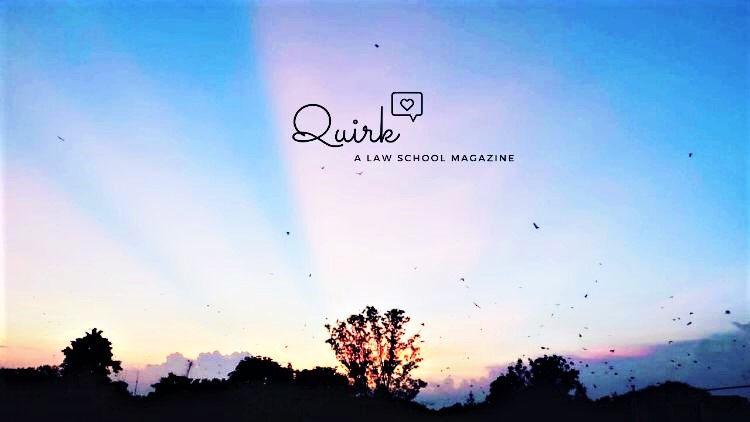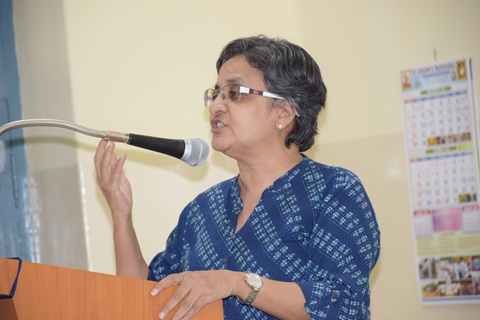This letter, penned by Prof. Sanyukta Chowdhury, talks about the value and importance of arts courses in our study and practice of law. Prof. Sanyukta graduated from NLSIU in 2005, and later returned here to teach Constitutional Law and Tax Law. She would like to also thank Amit Chowdhury (Batch of 2005) for key inputs and suggestions.
The illustration was designed by Akshit Singla (Batch of 2024).
At the time of its establishment, NLSIU’s approach to under-graduate legal education was unique. Remember, the year was 1986. The B.A. LL.B.(Hons.) programme was conceptualised against the backdrop of multi-disciplinary universities offering ‘law’ as a stand-alone post-graduate course.
What value does such a curriculum offer? The study of History, Political Science, Sociology and Economics (‘BA courses’) in the first two years is aimed at laying a foundation for understanding the present legal system. The curriculum of these courses is designed to align with the study of law. BA courses aren’t hurdles to be crossed; instead, active engagement with them allows for appreciation of the landscape in which a law would have been adopted, why it is what it is, and what it ought to be.
For instance, the History courses include discussion on the nature of colonial rule and colonial laws aimed at controlling people and extracting resources. These insights are vital for assessing the present governance structures and laws. Let’s take the example of the Indian Constitution. There is a naively originalist view that the Constitution came into existence at a particular instant and needs to be viewed in a self-enclosed manner. At best, this view allows for looking at foundational documents such as the constitutional assembly debates. Our Constitution draws significantly from the Government of India Act, 1935. That was a colonial document with scant concern for civil and human rights; separation of powers and federalism would be no priorities under that framework. Is it prudent to take at face value the articulation of rights, federalism and separation of powers in a Constitution influenced by a colonial document?
Similarly, study of Political Science, Sociology and Economics courses tell us inter alia about –
- Where the State and its laws derive legitimacy from;
- How you balance the fundamental questions of liberty and equality;
- How property rights came about;
- How we should distribute our social surplus.
The B.A. LL.B. programme serves to provide the political, social and economic context in which laws evolve. It allows for development of an understanding that law does not derive its legitimacy from fulfilling the criteria of legal validity (e.g., process of enactment). Instead, conception of a ‘just’ legal system begins to take form — a system of legal rules and institutions that respond to and are in lock-step with social facts, political values and economic needs.
Is such an approach to teaching law purposive? Educational institutions play an important role in development of civil society. A law university (through its faculty and research centres) can directly contribute to civil society by working towards social justice, protection of human and civil rights, and environmental issues (more specifically, sustainability). Such outcomes may be achieved by inter alia — (i) undertaking interdisciplinary research into areas such as gender justice, rights of marginalised communities, labour relations, protection and conservation of ‘commons’ etc; (ii) providing legal aid; (iii) spreading legal awareness; and (iv) conducting independent studies on implementation of government welfare schemes/ institutions under different laws.
However, such a model has limited scalability. Expansion of research centres and increase in faculty members cannot match the year-on-year addition to the alumni community. The University therefore seeks to empower and motivate its students to respond to the needs of the collective. The design of the academic programme allows for the necessary cognitive acquisitions; and experience within the University ecosystem should provide the motivation. Diversity within the student body, challenges of social co-existence on campus, interaction with rules and regulations — all inform notions of the collective as well as interdependence, together with the need for a shared understanding of individual liberty, equality, fairness, and ethics. Yet, generally, an inclination towards (a) certain kind of careerism, and (b) catering to the market is implicit in our understanding as undergraduate students (myself included).
There is no single reason that would explain this tendency; maybe, a brief reflection on my undergraduate years can offer some illumination. At the time of applying to NLS, I lacked an understanding of the purpose that study of law is supposed to serve. What I did know was that campus recruitment functioned the way it did for top MBA/ engineering institutes. (This may resonate with many still). Most of us were made to understand, quite early on in life, that financial independence is the career objective — and, sooner it is achieved, the better. There were other reasons as well that talks focused on a certain type of careerism within the student body — alumni were still finding their feet and much less information on possible career paths was available, NLS was a smaller, less diverse community, and availability bias focused attention towards particular measurable indicators of success (eg., partnership in a law firm).
The decision (to offer services to the market) was also a function of the times. High paying jobs in advisory practice of law firms or legal teams of MNCs came about only a few years post economic liberalisation in 1991. ‘Corporate jobs’ for lawyers had been uncommon till then. The narrative of upward mobility set-up in 1990s continued into the early noughties and securing such opportunities was still a cool new thing!
Much has changed since then. Many universities now cater to the demand for integrated legal education and NLS too has expanded its intake. Law firms have more options to choose from; and, law students have more information about the possibilities to explore. Diverse approaches towards legal activism, for example, have been shown over the years by NLS alumni. Media reports are common about the role they have played in constitutional and civil rights litigation.[1] Individual initiatives can also be centred on spreading awareness about the law and public institutions,[2] which makes legal educational resources freely accessible to all in order to enable civic participation; the first course was on community rights and forest governance). Legal practice aimed at safeguarding human and civil rights[3] is another path to explore. Research work into issues pertaining to social justice and rights as referred to above is being undertaken by NLS research centres such as Centre for the Study of Social Exclusion & Inclusive Policy, Centre for Labour Studies, and Centre for Women and the Law, as well as other universities and research institutions. What’s more, conventional fields also allow for often unexplored pursuits. NLS alumni have joined academia not just for teaching law subjects, but also history and political science.[4]
As may be inferred from the above discussion, legal education can be used in a manner that is targeted to match the needs of civil society, and give a sense of purpose that goes beyond the self. In addition to other information sources, internships are a good way of getting a close look at different career paths and knowing details about work profile, remuneration, workplace environment as well as possibility of making career shifts.
The best way of making most of the opportunity that NLS provides is to engage holistically with the academic programme as well as with the University community. While an enumeration of how to do so is not the aim of this piece, it flows from above that the BA courses should not be disregarded, in anticipation for the “real” subjects to begin. The reasons have already been explained. It is equally valuable to engage in dialogue with each other actively and learn from each other’s diversity of life experiences. This builds a real world understanding of social facts, political values and economic needs as referred to above. In short, while here in NLS, no set of pre-conceived notions should limit the imagination of the purpose legal education can serve.
[1] For example, Menaka Guruswamy, Arundhati Katju, Pritha Srikumar, and Arun Srikumar in the Navtej Singh Johar ruling.
[2] For example, Aju John founded Nagrik Open Civic Learning
[3] For example, Alternative Law Forum, and Samana Centre for Gender, Policy and Law
[4] For example, Rohit De is faculty at Yale University’s Department of History and teaches inter alia South Asian history and postcolonial histories of India, Pakistan and Bangladesh. His work such as ‘A People’s Constitution: Law and Everyday Life in the Indian Republic’ contributes towards building an understanding of history from the lens of people.




